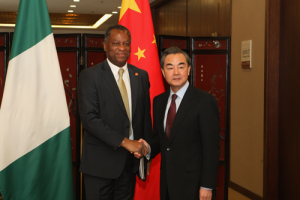Two Chinese citizens working at a gold mine in southwestern Nigeria were kidnapped on April 5, China’s Foreign Ministry confirmed on Thursday. “Upon learning of it, the Chinese consulate general in Lagos immediately activated emergency response mechanism, urging the Nigerian police to rescue the hostages and ensure their safety, and guiding the enterprise involved to deal with the situation properly,” spokesperson Zhao Lijian told the media in a regular press briefing on April 8.
The incident took place in Nigeria’s Osun state. According to China’s Global Times, a local police spokesperson “said in a statement that around 4 pm that day, a group of criminals attacked the local gold mine and abducted two Chinese citizens. The two men, Zhao Jian, 33, and Wen, 50, were employees at the gold mine.” Two security guards were shot and injured during the attack.
The kidnapping followed a previous attack and abduction case of Chinese nationals in Osun state. Two other Chinese workers were kidnapped on March 31, and rescued by police on April 6 – the day after the attack on the gold mine.
In February, three Chinese workers were abducted from a gold mine in Osun state. It’s not immediately clear if this was the same mine attacked on April 5. In the February incident, the Chinese workers’ police escort was killed in the attack. The three Chinese workers were rescued by police on February 9, according to AFP, but no arrests were made, raising questions over whether a ransom had been paid to secure their release.
“Kidnapping for ransom, which used to be common in Nigeria’s oil-producing south, has lately spread to the other parts of the country,” AFP reported back in February. “The victims are usually released after a ransom is paid, although police rarely confirm if money changed hands.”
“We are very often the ‘sweet pastry’ for local violent militants. I once heard a friend relay the story of a Chinese worker who experienced a kidnapping firsthand; he had literally gone to hell on earth,” Global Times quoted a Chinese engineer who works in Nigeria as saying. The engineer said most Chinese companies have hired security guards to protect their workers – presumably the two guard injured in this week’s attack were supposed to provide protection.
According to the China Global Investment Tracker, run by the American Enterprise Institute, Chinese companies had cumulatively invested over $40 billion in Nigeria as of 2020, with the vast majority of that going to either transportation infrastructure ($17.1 billion) or energy projects ($16.5 billion, mostly in the oil sector specifically). That makes oil-rich Nigeria the top destination for Chinese investment in sub-Saharan Africa.
Data from the China-Africa Research Initiative Johns Hopkins University SAIS put the number of Chinese workers in Nigeria at 12,199 as of the end of 2019.
The surge in kidnappings comes at an awkward time, as China and Nigeria mark the 50th anniversary of their diplomatic relationship. Chinese Foreign Minister Wang Yi visited the country in January, where he told his Nigerian counterpart that “China has always prioritized its cooperation with Nigeria and taken Nigeria as a major strategic partner.”
“Wang Yi added, this year is vital for China-Nigeria relations. It is the right time for the two countries to set up an intergovernmental committee and make overall plans for bilateral cooperation,” according to a read-out from the Chinese Embassy in Nigeria.
Zhao, the Foreign Ministry spokesperson, insisted that China was not considering drawing down its presence in Nigeria due to the recent kidnappings. “We have a number of projects and Chinese funded enterprises in Nigeria, even though the local security situation has never been ideal,” he told reporters. “We will not resort to evacuation because of some occasional individual cases.”
































